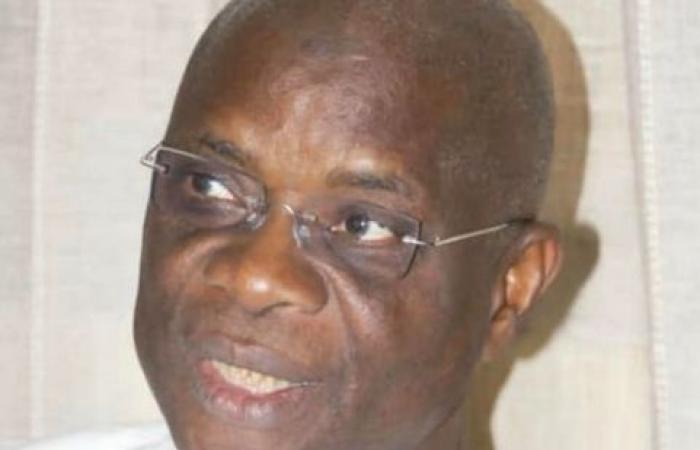The former minister in charge of Monitoring the Emerging Senegal Plan (PSE) Abdoul Aziz Tall shares his thoughts on the first steps of the new regime. In this interview, he calls for a change in behavior, an essential condition to ensure the ruptures expected from the new regime. Mr. Tall, also a former general delegate for State Reform, suggests some avenues to take to succeed in the “national transformation agenda 'Senegal 2050'”.
In a recent contribution published in the press, you wrote this: “A regime which has barely established itself must make its mark and set its benchmarks”. Does this apply to the new regime in place for eight months?
It seems to me entirely premature to respond in a peremptory manner. Following the presidential election, the recent majority acquired at the level of the National Assembly constitutes a step that is both critical and major in the establishment of institutional guidelines. Let me use such an expression. Beyond that, we must always consider the critical aspects in the construction and functional evolution of a team. It is added that the State of Senegal has always relied on extremely solid foundations, in view of its history and the actors who built the nation and the State. Therefore, the marks and benchmarks that you mention cannot be suddenly disconnected from the republican exercise which has always existed, whatever the ruptures announced. In other words, there are essential and immutable principles that no State can ignore because these guidelines constitute the very foundation of the State and the Nation. It is now necessary to move towards the “transformation of the test” to borrow a language specific to rugby, that is to say moving from the enormous hope nourished by charismatic leadership and incontestable legitimacy to a membership based on economic and social achievements resulting from the implementation of the “Senegal 2050” project.
How do you judge the new regime's action record after eight months of governance?
Talking about a balance sheet in the managerial sense of the term seems just as premature to me. In eight months of governance, it is difficult to comment on the results. Precisely, a period of eight months remains derisory over a five-year mandate. On the other hand, as in any functioning system, it is imperative to ensure permanent monitoring which allows possible malfunctions to be detected very early and corrective measures to be taken. This monitoring is also an opportunity to identify positive achievements and strengthen them. This is the meaning that the Anglo-Saxons give to the concept of “control” which means mastery of the situation as the activity unfolds. Not to be confused with a verification which is carried out over a longer period and which can give rise to results whose interpretations can be both broader and more detailed. It is, moreover, this last conception which would best lend itself to the notion of balance sheet. The recent establishment of a structure responsible for monitoring and executing public policies could well facilitate the achievement of the objectives and expected results.
The Prime Minister announced, during the last Council of Ministers, that he will make his General Policy Declaration (DPG) on December 27. What do you expect from this ritual?
The General Policy Declaration is an event registered in the Republican calendar each time the Prime Minister has a new tenant. I must admit, having participated in the past in the preparation of this type of speech, that it is rather a question of announcing to the people, via Parliament, a compilation of the priority actions of the executive, which is inspired by a program. Here is the national transformation agenda “Senegal 2050”. This is once again the place to recall the great importance that must be given to monitoring and the diligent implementation of public policies set out in the DPG. Beyond that, it is a ritual event where each actor (majority and opposition) plays their part. It is also a question of specifying the application of the presidential program by evoking, as much as possible, the details, the timetable and the financing of the measures envisaged.
You were minister in charge of monitoring the Emerging Senegal Plan (PSE). Are there any similarities between the PSE and “Vision Senegal 2050”?
Let us start from the principle that the State always evolves in a logic of continuity. Therefore, it is completely normal to find points of convergence. Certainly, the two plans are not Siamese brothers, but their main objective remains and remains the economic and social development of Senegal. The new regime will necessarily rely on the human resources skills that exist to carry out its mission successfully. And this is the institutional coherence that must be observed, the vocation of the State agent being to contribute to the diligent implementation of the policies defined by the Head of State beyond all other considerations. .
In the same forum, you called for “an imperative change in citizens' behavior” if we want to achieve the break so much sung about by the new authorities. Does this mean that civic-mindedness and citizenship will be the key to the success of the regime in place?
It is essential to recall and strongly emphasize that strategic questions linked to civics and citizenship must precede any culture and action of good governance. Permanently, the State, society and, by extension, the school and the media, as well as the family must constitute what I call the triangle of republican values in terms of promotion, education, awareness and of culture. Otherwise, any action, no matter how successful, is doomed to failure. We should have no illusions: the conditions for the success of the new regime are intrinsically linked to a major change in the behavior of our fellow citizens. Whatever the legitimacy of the desire for a break, the citizen must be convinced that he too remains at the center of the transformational process. In this regard, the public debate relating to governance must first question the counter-values of a society whose dysfunctions arise from its own behavior.
From this introspection, it clearly appears that the incivism and incivility of most of our compatriots, which surpass all understanding, should be at the heart of concerns. The failure to respect the most basic values and rules in terms of civic behavior is more than factual. This, through the anarchy which reigns almost everywhere, particularly in urban areas. The examples are legion. One of the most visible aspects of these behavioral discrepancies concerns the use of mopeds in our cities which offer a spectacle that is both undignified and distressing with drivers who blithely violate the requirements of the Highway Code. The failure to wear a helmet has become blatantly commonplace. Worse still, there are numerous attacks on citizens by often first-time offenders and which are constantly carried out with the use of mopeds. Alongside “these machines of death”, the waltz of carts on busy arteries is now part of the urban furniture. Unfortunately, these are only samples of acts of indiscipline and behavior to be banned to support the new authorities in this dynamic of rupture. Failing this, they will be forced, via the powers of delegates of the people, to spend more time correcting our collective imperfections instead of concentrating on the essentials of their sovereign missions.
In your opinion, how can the new regime put an end to these abuses?
Upstream, it is essential to demonstrate leadership by example. This is the guarantee of a ripple and contagion effect at the community level. It would also be necessary to outline an awareness, communication and social mobilization strategy. Whether it is radio, television or newspapers and social networks, theater groups, citizen reminder messages must be permanent through different communication media. Regarding audiovisual media, it is high time, as Salvador Dali said, that our televisions stop being “instruments of cretinization of our society”.
The specifications of press organs which benefit from state support should include a clause for participation in the effort to restore civic and republican values. Furthermore, civic education programs in schools should be systematized and promoted.
Obviously, for you, the content of certain television programs, among others, have a negative impact on the advent of a new type of Senegalese?
Everyone can see that we are invaded, all week long, by television series and sketches which are far from directing Senegalese citizens towards good behavioral practices within society. On the contrary, they are full of disconcerting nonsense and where obscenity competes with vulgarity, disrespect, indecency, physical and verbal violence. When we watch some of the programs on our televisions, we cannot help but agree with this psychologist who affirmed that, in these immodest images, everything which contributed to the intimacy of married life is reduced to the rank of common practice today. Thus, we see the progressive loss of our values of “Jom”, “Kersa” and “Sutureu”.
You suggested the creation of an institution responsible for promoting good citizenship. What should its mission be?
This awareness-raising work could be entrusted to a civic promotion structure, which would be housed at a strategic level to give it the institutional weight necessary to accomplish its mission. Better still, it would be appropriate to establish a ministry in charge of promoting citizenship. In this context, non-compliance with the rules and principles that guide citizen behavior must be subject to sanctions without discrimination from authorized public services.
There is clearly a strong correlation between the state of development of a Nation and the level of elevation of the civic spirit of its citizens!
Asian countries have given us proof of this. We cannot delegate to a power the authority to direct us and then behave in a way that can only hinder the exercise of its mission. The media, which are both relays and opinion leaders, must support the regime in the advent of civic behavior as opposed to those who openly defy the rules of citizenship and violate the rights and privacy of their citizens. fellow citizens.






